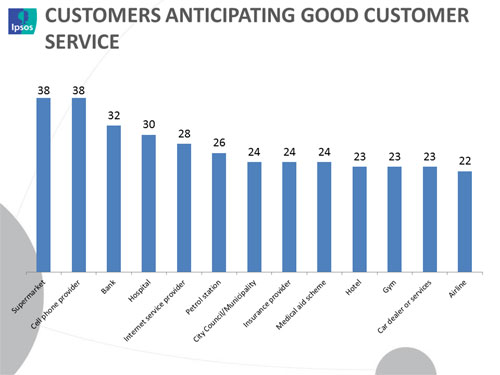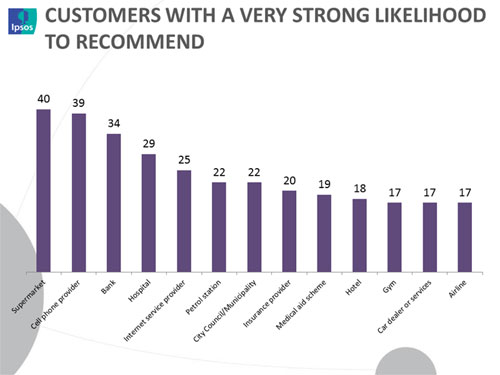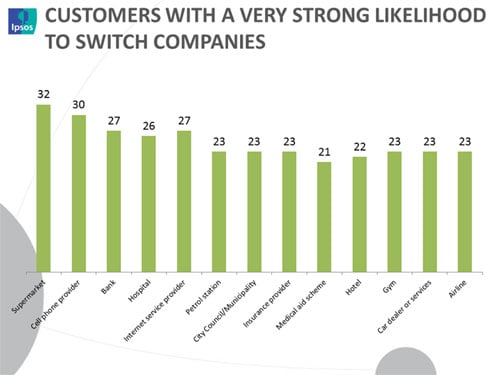
Are we settling for mediocre customer service?
It has become more important than ever for companies to listen to their customers and respond to problems as they arise. A recent study by Ipsos South Africa has found that only about once in every four consumers anticipates receiving excellent service from most service providers and retailers. "This sadly implies that we have become quite accustomed to inferior service," states Rentia Krämer, head of Loyalty research at Ipsos South Africa.
Results show that there is more anticipation of good service from cell phone providers, supermarkets and banks, with 38% of South Africans expecting to receive top notch service from cell phone providers. The lowest expectation of good service is held for airlines, car dealerships and gyms.
Although expectations of good service are highest for cell phone providers (like Cell C), banks and supermarkets, the likelihood to switch to another provider is also highest for these three entities. This implies that consumers have high expectations to receive good service but are also most likely to switch to a service provider that offers more, or better in terms of service and/or value.
Word-of-mouth has become, as we saw this past week, a powerful mechanism to promote or harm a company - relative to the experiences customers have when dealing with service providers. The likelihood to recommend a service provider is highest for cell phone providers and supermarkets, in line with the rest of the study's results. However, the scores are quite low overall and confirm the theory that South Africans are generally not happy with their experiences and have been forced to accept inferior service. "Of course this opens up opportunities for service providers to differentiate themselves from competitors by providing better than expected service," says Krämer.
Ipsos specialises in measuring customer experience and enables companies to use the feedback from customers to respond to issues in a timeous manner so that the problem of disgruntled consumers can be avoided and turned around by making managers responsible for addressing issues. An issue remains unresolved until a customer has been contacted and issues resolved. This might lessen the possibility of more banners with the views of unhappy customers doing the rounds.
About the study
A total of 3,600 personal face-to-face interviews were conducted with randomly selected adult South Africans. The interviews were done in the homes and home languages of respondents. Trained quantitative fieldworkers from all population groups were responsible for the interviewing, which took place from 20 February to 28 March 2014. This methodology ensured that the results are representative of the views of the universe and that findings can be weighted and projected to the universe - i.e. South Africans 18 years and older.
Interviews were conducted using CAPI (Computer Assisted Personal Interviewing) and all results were collated and analysed in an aggregate format to protect the identity and confidentiality of respondents.
About Ipsos
Ipsos is an independent market research company controlled and managed by research professionals. Founded in France in 1975, Ipsos has grown into a worldwide research group with a strong presence in all key markets. Ipsos ranks third in the global research industry.
With offices in 86 countries, Ipsos delivers insightful expertise across six research specializations: advertising, customer loyalty, marketing, media, public affairs research, and survey management.
Ipsos researchers assess market potential and interpret market trends. They develop and build brands. They help clients build long-term relationships with their customers. They test advertising and study audience responses to various media and they measure public opinion around the globe.
Ipsos has been listed on the Paris Stock Exchange since 1999 and generated global revenues of €1,712,4 million (2 274 M$) in 2013.
Visit www.ipsos.co.za to learn more about Ipsos' offerings and capabilities.
- Unlocking the value of creativity in advertising: How to bridge the creativity gap15 Apr 13:47
- 4 habits keeping your brand poor26 Mar 16:08
- Understanding consumer mindsets for growth in 202407 Mar 08:52
- South Africa's unemployment nightmare: The burden on its people09 May 10:05
- Global survey shows shrinking trust in internet29 Nov 10:17


















